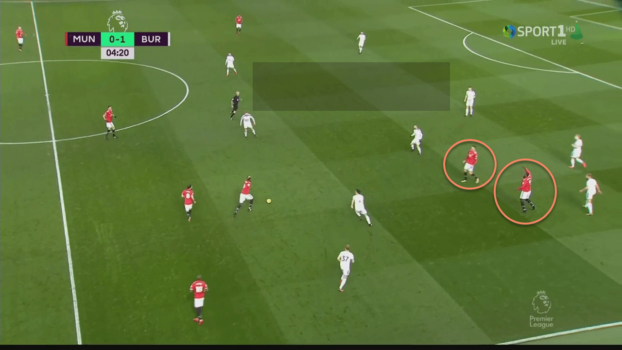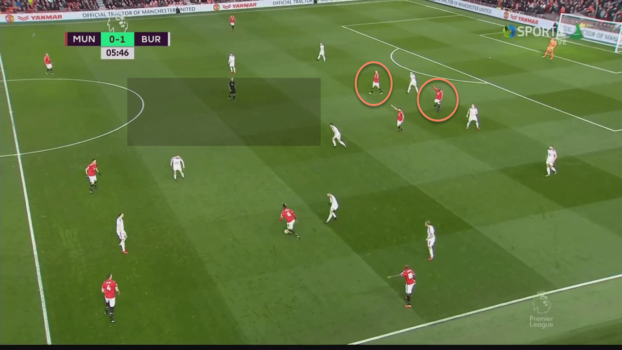Lineups:
Manchester United (4-4-2): De Gea; Young, Jones, Rojo, Shaw; Mata, Pogba, Matic, Rashford; Ibrahimovic, Lukaku
Burnley (4-1-4-1): Pope; Bardsley, Long, Mee, Taylor; Cork; Gudmundsson, Hendrick, Defour, Arfield; Barnes
Chris Smalling and Antonio Valencia were out injured for Manchester United, as was backup fullback Matteo Darmian, which necessitated a reshuffle at the back for Jose Mourinho. Luke Shaw came in at left-back, with Ashley Young moving across to right-back, and Marcos Rojo partnered Phil Jones at centre-back. Jesse Lingard was named on the bench, so Zlatan Ibrahimovic made his first start in the league this season, alongside Romelu Lukaku.
Nick Pope continued in goal for Burnley, while James Tarkowski’s retrospective ban meant that Kevin Long came in at the back alongside Ben Mee, and Charlie Taylor played at left-back in place of the injured Stephen Ward. Chris Wood’s continued injury woes allowed Ashley Barnes to start up top, while Scott Arfield continued to deputise for Robbie Brady.
Major tactical themes:
Zlatan and Lukaku not working together
Zlatan Ibrahimovic started a league game for the first time since his horrific knee injury back in April; however, instead of being a replacement for Romelu Lukaku, he started alongside the Belgian. Zlatan was taken off at half-time with United two goals down, and the duo’s performance together in those 45 minutes will not have encouraged Jose Mourinho. Ibrahimovic and Lukaku kept occupying the same zone of the pitch, congesting the play and getting in each other’s way. Most top-level football sides have moved away from two-striker formations; on the rare occasions that they are deployed, the two frontmen must ensure that they create space for each other as well as take turns dropping deep and pulling wide. Neither Zlatan nor Lukaku did this, even when there was acres of room in front of the Burnley defence to be exploited by a player dropping deeper. There was also scant evidence of the two linking up or playing off each other, and while Zlatan did drop deeper as the half progressed, he didn’t show enough to suggest that he can be trusted with the #10 role on a regular basis. Jesse Lingard was far more effective when he came on at half-time, and Jose must be careful before he decides to play the two strikers together again.


Matic at centre-back as United throw the kitchen sink
The pattern of the game was set from the off, as Burnley took an extremely early lead and then sat back to defend it. Going 2-0 up merely reinforced those instincts, and recognizing the fact that Burnley were not going to attack in the second half, Jose took Rojo off at half-time, moving Matic to centre-back. Lingard and Mkhitaryan came on for the Argentinian and Zlatan, which meant that Pogba was playing as the deepest midfielder with an array of attacking midfielders in front of him. Even though Matic was nominally a centre-back, he would often foray forwards, linking up with Pogba and Shaw. Jones was usually the only player back for United, as Mata and Lingard, in particular, played as interiors or floating #10s.
Matic could be an option at centre-backs in such games, where United dominate possession and the opposition aren’t expected to pose too much of a threat. He also allows United a much better range of passing from the back, as none of United’s centre-backs are especially proficient on the ball.
Set-piece defending a real worry
Manchester United conceded yet another goal from a set-piece, and while there was not much that could have been done about Steven Defour’s freekick into the top corner, the first goal was avoidable. Despite having a number of tall, physically imposing players starting almost every game, United seem to go to pieces when they have to defend a freekick or corner. Romelu Lukaku is especially culpable; his weak defending led to both of Manchester City’s goals in the derby earlier this month, while he failed to clear Johann Berg Gudmundsson’s freekick here, allowing Ashley Barnes to capitalize. This seems to be a systemic problem, as too many United players are passive in the box when the ball comes in, instead of attacking it. The marking is shoddy as well, with there often being confusion about who is picking whom up. While United do not use a zonal marking system, their man-marking leaves a lot to be desired, and this is exacerbated by their failure to clear the box or deal with the second ball. There needs to be a lot of work put into the training ground to rectify this, or else it could turn into a real area of weakness that could be ruthlessly exploited by opposition sides.

